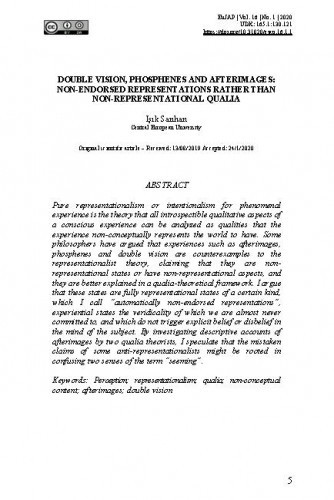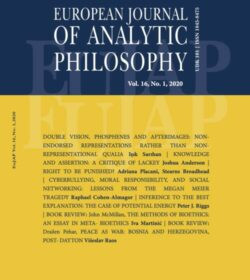Pure representationalism or intentionalism for phenomenal experience is the theory that all introspectible qualitative aspects of a conscious experience can be analyzed as qualities that the experience non-conceptually represents the world to have. Some philosophers have argued that experiences such as afterimages, phosphenes and double vision are counterexamples to the representationalist theory, claiming that they are non- representational states or have non-representational aspects, and they are better explained in a qualia-theoretical framework. I argue that these states are fully representational states of a certain kind, which I call “automatically non-endorsed representations”, experiential states the veridicality of which we are almost never committed to, and which do not trigger explicit belief or disbelief in the mind of the subject. By investigating descriptive accounts of afterimages by two qualia theorists, I speculate that the mistaken claims of some anti-representationalists might be rooted in confusing two senses of the term “seeming”.; Čisti reprezentacionalizam ili intencionalizam u pogledu pojavnog iskustva teorija je prema kojoj se svi introspektivno dostupni kvalitativni aspekti svjesnog iskustva mogu analizirati kao kvalitete svijeta koje iskustvo na nepojmovni način reprezentira. Neki filozofi su argumentirali da iskustva poput paslika, fosfena i dvostrukog vida predstavljaju protuprimjer reprezentacionalističkoj teoriji, tvrdeći da su to nereprezentacijska stanja ili da posjeduju nereprezentacijske aspekte, te da ih je bolje objasniti u okviru teorije kvalija. Argumentiram da su ova stanja u potpunosti reprezentacijska stanja određene vrste koju nazivam „automatski neprihvaćenim reprezentacijama“. To su iskustvena stanja koja najčešće ne prihvaćamo kao istinita i koja ne aktiviraju eksplicitna vjerovanja u umu subjekta. Kroz istraživanje opisnih objašnjenja paslika koje nudi dvoje teoretičara kvalija, predlažem da je moguće da su pogrešne tvrdnje nekih antireprezentacionalista ukorijenjene u miješanju dvaju smisla riječi „naizgled“.
Sažetak

 European journal of analytic philosophy : 16,1(2020) / editor-in-chief Marko Jurjako.
European journal of analytic philosophy : 16,1(2020) / editor-in-chief Marko Jurjako.